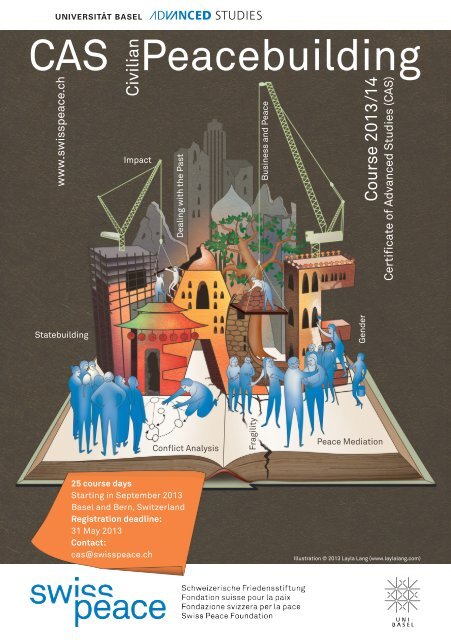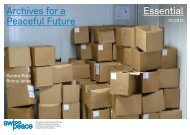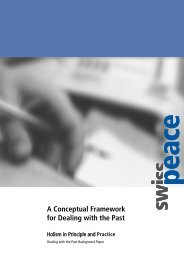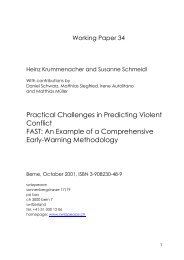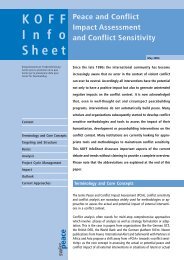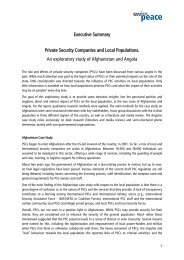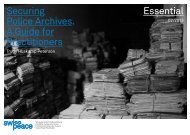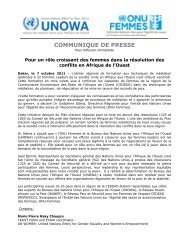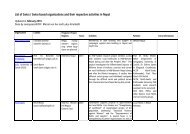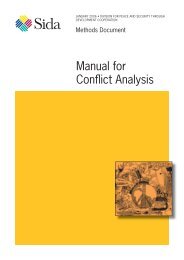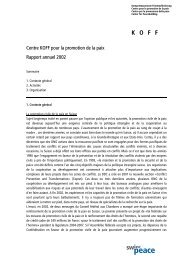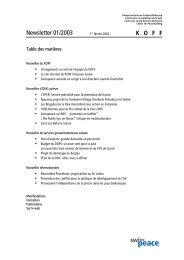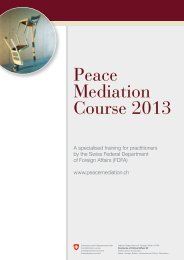Flyer CAS 2013/14 - Advanced Study Centre
Flyer CAS 2013/14 - Advanced Study Centre
Flyer CAS 2013/14 - Advanced Study Centre
You also want an ePaper? Increase the reach of your titles
YUMPU automatically turns print PDFs into web optimized ePapers that Google loves.
<strong>CAS</strong><br />
www.swisspeace.ch<br />
Civilian<br />
Impact<br />
Peacebuilding<br />
Dealing with the Past<br />
Business and Peace<br />
Course <strong>2013</strong>/<strong>14</strong><br />
Certificate of <strong>Advanced</strong> Studies (<strong>CAS</strong>)<br />
Statebuilding<br />
Gender<br />
Conflict Analysis<br />
Fragility<br />
Peace Mediation<br />
25 course days<br />
Starting in September <strong>2013</strong><br />
Basel and Bern, Switzerland<br />
Registration deadline:<br />
31 May <strong>2013</strong><br />
Contact:<br />
cas@swisspeace.ch<br />
Illustration © <strong>2013</strong> Layla Lang (www.laylalang.com)
Aim and Content<br />
In the past decade, civilian peacebuilding<br />
has come to play a crucial role when<br />
striving to transform violent conflicts,<br />
ensure peace, rebuild war-torn societies<br />
and prevent violence from re-erupting.<br />
This postgraduate course provides<br />
participants with a holistic understanding<br />
of civilian peacebuilding. At the end of the<br />
program, participants are aware of the<br />
state of the art in selected peacebuilding<br />
fields, they are able to link theoretical and<br />
conceptual inputs to their concrete work<br />
activities and to critically reflect on<br />
peacebuilding practices. Furthermore,<br />
they benefit from their newly established<br />
network among peacebuilding professionals<br />
in Switzerland and beyond.<br />
Course Structure<br />
The course consists of five modules<br />
spread over one year (25 course days):<br />
1. Introductory module<br />
2. Thematic module<br />
3. Training module<br />
4. Applied module<br />
5. Concluding module<br />
Description of the Modules<br />
1. Introductory Module (2 Days)<br />
How has the field of civilian peacebuilding<br />
evolved, both in terms of academia and<br />
practice? Participants review the main<br />
peacebuilding theories and discourses,<br />
discuss terms and concepts, and examine<br />
the development of peacebuilding policies<br />
and practices. A special focus is put on<br />
conflict analysis and on how violent<br />
conflicts can be prevented.<br />
2. Thematic Module (12 Days)<br />
Participants receive theoretical-conceptual<br />
and practice-oriented inputs in six<br />
major civilian peacebuilding fields and<br />
reflect on peacebuilding practices.<br />
Peacebuilding Analysis and Impact<br />
What impact do peacebuilding efforts<br />
have? Which peacebuilding strategies are<br />
effective? How can peacebuilding interventions<br />
be made more relevant and<br />
sustainable? This thematic block analyzes<br />
failures and success stories in peacebuilding<br />
with the aim of stimulating<br />
reflection on peacebuilding practices.<br />
Participants critically explore the current<br />
debates and policy frameworks and<br />
assess the challenges of translating them<br />
into practice.<br />
Gender in Conflict and Peacebuilding<br />
How do gender roles change during<br />
phases of violent conflict and war? And<br />
how does this affect peacebuilding<br />
processes? Participants examine the<br />
gender-specific dimensions in conflict<br />
and peacebuilding and become acquainted<br />
with the respective policy frameworks<br />
and their operationalization. Participants<br />
reflect critically on the notions of masculinity,<br />
violence and militarism in wartime<br />
as well as on discourses on women as<br />
actors and victims of war. An analytical<br />
framework for examining gender-aspects<br />
throughout the course is introduced.<br />
Peacebuilding and Statebuilding<br />
What role for the state in peace and<br />
conflict? How can state and non-state<br />
actors contribute to peacebuilding? What<br />
role for the international community? This<br />
thematic block looks at the state, governance<br />
structures and practices in weak,<br />
fragile and conflict-affected contexts. It<br />
examines the evolution of understanding<br />
the nature of the state, how a state can be<br />
organized and what its main tasks and<br />
responsibilities are, both in theory and<br />
practice. Participants look critically at the<br />
concept of state fragility, they reflect on<br />
the complex interplay between peace-
uilding and statebuilding and assess the<br />
relevance of ongoing debates in policy<br />
circles about the role of external actors in<br />
these processes.<br />
Peace Mediation<br />
Mediators bring conflict parties to the<br />
negotiating table and support them in<br />
finding agreements. Mediation used to be<br />
a domain reserved exclusively for diplomats<br />
and UN experts but in the last<br />
decade the range of actors has broadened<br />
and frequently professional mediators are<br />
brought in. Participants gain insights into<br />
the diverse challenges, which mediators<br />
face when facilitating dialogue and<br />
searching for peace agreements.<br />
Dealing with the Past<br />
Finding a way to deal with a violent past is<br />
often argued to be the basis for lasting<br />
peace, democracy and the rule of law. This<br />
includes the identification of past human<br />
rights violations, the prosecution of<br />
perpetrators on a national or international<br />
level, the rehabilitation of victims, the<br />
establishment of truth commissions,<br />
reparation programs, and institutional<br />
reforms. Participants critically reflect on<br />
such processes and assess their effects<br />
on society, victims and perpetrators.<br />
Business, Conflict and Peacebuilding<br />
Violent conflicts lead to an unstable<br />
environment for engaging in business<br />
activities. At the same time businesses<br />
influence the economic, political and<br />
social dynamics of conflicts. This thematic<br />
block explores the role of business actors<br />
in violent conflicts and peace processes.<br />
Participants analyze the link between<br />
economic activity and conflict dynamics<br />
and discuss the chances and challenges<br />
of involving companies in conflict transformation.<br />
3. Training Module (8 Days)<br />
Participants are trained in practical tools<br />
and pertinent methods for civilian<br />
peacebuilding. In a special training course,<br />
participants refine their skills in analyzing<br />
conflicts, developing effective strategies,<br />
designing relevant projects and assessing<br />
the intended and unintended impacts of<br />
peacebuilding interventions.<br />
Additionally, participants select two<br />
practice-oriented courses from the<br />
training series offered by swisspeace’s<br />
KOFF Center for Peacebuilding. The<br />
program is published on: http://koff.<br />
swisspeace.ch/activities/training-series.<br />
4. Applied Module (2 Days)<br />
Participants study different peacebuilding<br />
processes and identify issues related to<br />
impact, gender, statehood, mediation,<br />
dealing with the past and business actors<br />
in different contexts. Senior experts<br />
comment on participants’ presentations<br />
and share their experiences.<br />
5. Concluding Module (1 Day)<br />
Under the supervision of an expert,<br />
participants write a conceptual or<br />
practice-oriented final thesis or conduct a<br />
practical project relevant to their work<br />
context. In a final block, conclusions on<br />
civilian peacebuilding are drawn and an<br />
outlook on future developments is given.<br />
Course Language<br />
Courses are taught in English but assignments<br />
may be written in English, German<br />
or French.<br />
Course Fee<br />
CHF 8,500 including course materials.<br />
Travel, food and accommodation costs are<br />
not included in the fee. No scholarships<br />
are available.
Target Audience / Terms of Admission<br />
This postgraduate course is designed for<br />
practitioners working in fields such as<br />
peacebuilding, development cooperation,<br />
human rights and humanitarian work or<br />
peace and conflict studies and those who<br />
aspire to work in one of these areas. A<br />
minimum of two years of professional<br />
experience in relevant fields and a<br />
university degree (MA) or an equivalent<br />
educational background are required. A<br />
maximum of 25 participants is admitted<br />
onto the course.<br />
Workload, Time Frame and Venue<br />
The course consists of 25 course days and<br />
can be completed within a year or spread<br />
over two years. 20 ECTS are awarded<br />
(equivalent to 560 working hours). Assignments<br />
include an essay, a learning portfolio,<br />
a group presentation and a final thesis<br />
or project. Active participation throughout<br />
the course is required.<br />
Most modules take place on Fridays and<br />
Saturdays in Basel, the KOFF training<br />
courses are organized on weekdays in<br />
Bern.<br />
September <strong>2013</strong>: introductory module<br />
October <strong>2013</strong> to April 20<strong>14</strong>: thematic module<br />
and training module<br />
May 20<strong>14</strong>: applied module<br />
June to September 20<strong>14</strong>: concluding module<br />
Diploma<br />
Successful participants receive a Certificate<br />
of <strong>Advanced</strong> Studies (<strong>CAS</strong>) in Civilian<br />
Peacebuilding from swisspeace and the<br />
University of Basel.<br />
Host<br />
The Swiss Peace Foundation swisspeace<br />
is a practice-oriented peace research<br />
institute associated with the University of<br />
Basel and located in Bern. swisspeace<br />
aims to build up Swiss and international<br />
actors’ civilian peacebuilding capacities<br />
by conducting research and providing<br />
knowledge, training, networking opportunities<br />
and a platform for sharing experiences.<br />
Directors of Studies<br />
Prof. Dr. Laurent Goetschel /<br />
Franziska Sigrist (course management)<br />
Faculty<br />
swisspeace experts facilitate the modules<br />
together with other experienced practitioners<br />
and renowned academics from<br />
Switzerland and beyond. Please visit the<br />
course website for an updated faculty list.<br />
Application Deadline<br />
31 May <strong>2013</strong><br />
Contact and Application<br />
Franziska Sigrist, Training Officer<br />
swisspeace<br />
Sonnenbergstrasse 17, P.O. Box<br />
CH-3000 Bern 7<br />
Phone +41 (0)31 330 12 12<br />
Fax +41 (0)31 330 12 13<br />
www.swisspeace.ch , cas@swisspeace.ch


